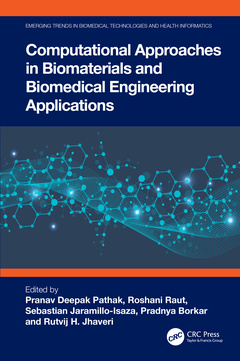Computational Approaches in Biomaterials and Biomedical Engineering Applications Emerging Trends in Biomedical Technologies and Health informatics Series
Coordonnateurs : Deepak Pathak Pranav, Raut Roshani, Jaramillo-Isaza Sebastian, Borkar Pradnya, Jhaveri Rutvij H.

Computational Approaches in Bioengineering, Volume 2?Computational Approaches in Biomaterials and Biomedical Engineering Applications is a comprehensive and up-to-date resource that provides a broad overview of the use of computational methods in the fields of biomaterials and biomedical engineering. Written by a team of experts in the field of biomaterials and biomedical engineering, it provides a wealth of information on the use of computational methods in these fields. Furthermore, it explores emerging trends and discusses future directions and associated limitations in the field. Through thorough exploration and explanation, it showcases the latest research and advancements, offering valuable insights into how computational methods are utilized to design and optimize biomaterials, simulate biological processes, and develop innovative medical devices.
FEATURES
- Provides practical guidance and real-world examples to help readers apply computational approaches effectively in their work.
- Explores the diverse computational approaches employed in biomaterials and biomedical engineering applications, offering a comprehensive view of the field.
- Introduces emerging topics and cutting-edge techniques, keeping wide range of readers at the forefront of advancements in computational bioengineering.
- Discusses the integration of computational methods in biomaterials and biomedical engineering, fostering a deeper understanding of their synergistic potential.
- Provides a valuable resource for researchers, practitioners, and students alike, serving as a comprehensive guide to computational approaches in biomaterials and biomedical engineering applications.
The book is well-organized and easy to read. The chapters are written in a clear and concise style, and they provide a comprehensive overview of the topics covered. The book is also well-illustrated with figures and tables that help to explain the concepts discussed in the text. With its comprehensive coverage, practical examples, and expert insights, this book serves as a valuable resource for researchers, students, and professionals in the fields of biomaterials and biomedical engineering.
1. Use of Biomaterials in the Field of Biomedical Engineering: Current Trends, Challenges, and Opportunities in Implementations ; 2. Applications of Biomaterials in Advanced Drug Delivery Systems ; 3. Biomaterials in Ophthalmology: Advancements, Applications, and Challenges ; 4. Use of AI and Machine Learning for the Analysis of Cellular Images in Breast Cancer ; 5. Genetic Diagnosis, Classification, and Risk Prediction in Cancer Using Next-Generation Sequencing in Oncology ; 6. AI and ML in the Treatment of Cardiovascular Diseases ; 7. Role of Big Data, AI, and Machine Learning in Decisions for Disease Diagnosis and Treatment ; 8. Artificial Intelligence in Drug Research—A New Wave of Innovation in Drug Discovery162 ; 9. Significance of Artificial Intelligence in the Recognition, Characterization, and Prediction of Hepatocellular Carcinoma ; 10. Artificial Intelligence Applied to Neuromotor Rehabilitation Engineering: Advances and Challenges; 11. Emerging Computational Methods Applied to BCI Systems for Restoring Motor Functions ; 12. Enhancing Telerehabilitation Using Wearable Sensors and AI-Based Machine Learning Methods
Dr. Pranav Deepak Pathak is an associate professor at the MIT School of Bioengineering Sciences & Research, Pune, with more than 14 years of teaching experience. He received his undergraduate and postgraduate degrees from Sant Gadge Baba Amravati University, India, and a doctoral degree from Visveswaraya National Institute of Technology, Nagpur, India, in chemical engineering. He has published several papers in peer-reviewed international journals, written book chapters, and edited four books; he has also filed several patents to his credit. He also received grants for several projects. He participated in various national/international conferences, workshops, and training. His research interests include bioengineering, biorefinery, and wastewater treatment.
Dr. Roshani Raut obtained her PhD degree in computer science and engineering and ME and BE degrees in computer science and engineering. She has more than 20 years of experience and currently she is working as a professor in the Department of Information Technology and Dean International Relations at Pimpri Chinchwad College of Engineering, Pune, India. She is guiding a PhD research scholar in the University of Technology, Petronas, Malaysia.
She is a member of IEEE and ISTE. She has availed research and workshop grants from BCUD, Pune University. She has presented more than 125 research communications in national and international conferences and journals. She has published 15 patents and has received grants for 10 patents. She worked as a convener for national and international conferences. She has published 10 books, where she worked as an author or editor, of various national and international publications like IGI Global, CRC/Taylor & Francis, and Scrivener Wiley. Her research area includes artificial intelligence, machine learning, data mining, and deep learning, among other areas.
Sebastián Jaramillo-Isaza is a skilled, rigorous, and highly motivated bioengineer
Date de parution : 05-2024
15.6x23.4 cm



